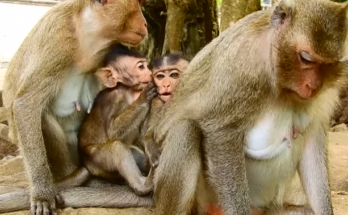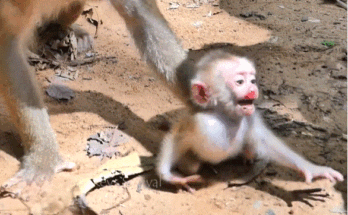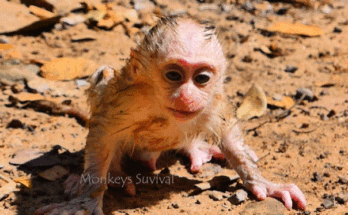Deep in the serene shadows of Angkor Wat, where roots of ancient trees wind through forgotten temples and golden sunlight filters like a dream through the canopy, a tiny life unfolded—a life that would unexpectedly change the rhythm of one quiet morning.
Her name wasn’t known. She was just one of many baby monkeys born into the vast wilderness. But the moment she peeked out from beneath her mother’s fur—eyes wide, face still slightly wrinkled from birth—it was clear that this little one had a spirit that could stir even the coldest heart.
She wasn’t the strongest. In fact, her frame was small and fragile, even by baby monkey standards. But from her very first breath, she clung fiercely to her mother’s chest with the quiet determination of a soul that knew what it meant to fight for love. Her tiny fingers wrapped around her mother’s fur as if she feared the wind itself might try to take her away.

Tourists with cameras paused, enchanted—not because she performed tricks or chased food, but because she simply… existed. Delicately. Bravely. Softly.
As the mother monkey gently groomed her baby, a quiet reverence spread across the forest floor. The mother didn’t rush, didn’t grow impatient. She wiped her baby’s brow with slow, loving motions, the way a human mother might wipe a tear or cradle a sleeping child. The baby, still learning the rhythm of her world, reached up with trembling hands to touch her mother’s face—her first attempt at understanding love.
Nearby, older monkeys played and tumbled, carefree and wild. But this baby didn’t yet leap or climb. Instead, she pressed herself close to her mama’s warmth, her heartbeat steady like a lullaby. It was in this simplicity—this raw, unfiltered tenderness—that people watching began to cry.
One woman whispered, “She looks like she’s dreaming of something better.”
And maybe she was.
For all her innocence, the baby was a silent teacher. A reminder that in a world so full of noise, sometimes the softest beings carry the loudest messages: that love doesn’t need language, that protection can be offered with just a look, and that even in the wild, family means everything.
Later, as the mother nibbled on a banana offered by a tourist, the baby peeked out again, curiosity blooming behind her sleepy eyes. She reached out—a tiny, trembling hand toward the fruit. Not ready to eat it, but simply exploring the shapes of the world.
The mother broke off a soft piece, chewed it briefly, and gently passed it into her baby’s mouth. It was a gesture so instinctive, so human, that the crowd stood in stunned silence.
In that moment, under the rustling leaves and ancient stones, no one saw “just monkeys.” They saw love. Real love. The kind that spans species and continents and languages. The kind that makes strangers feel like family.
And as the sun dipped behind the temple walls, casting long golden beams across the forest floor, the baby curled once more into her mother’s arms. A soft yawn. A tiny sigh. And the world, for just a moment, felt gentle again.
She didn’t need a name to be remembered.
She only needed that moment.


